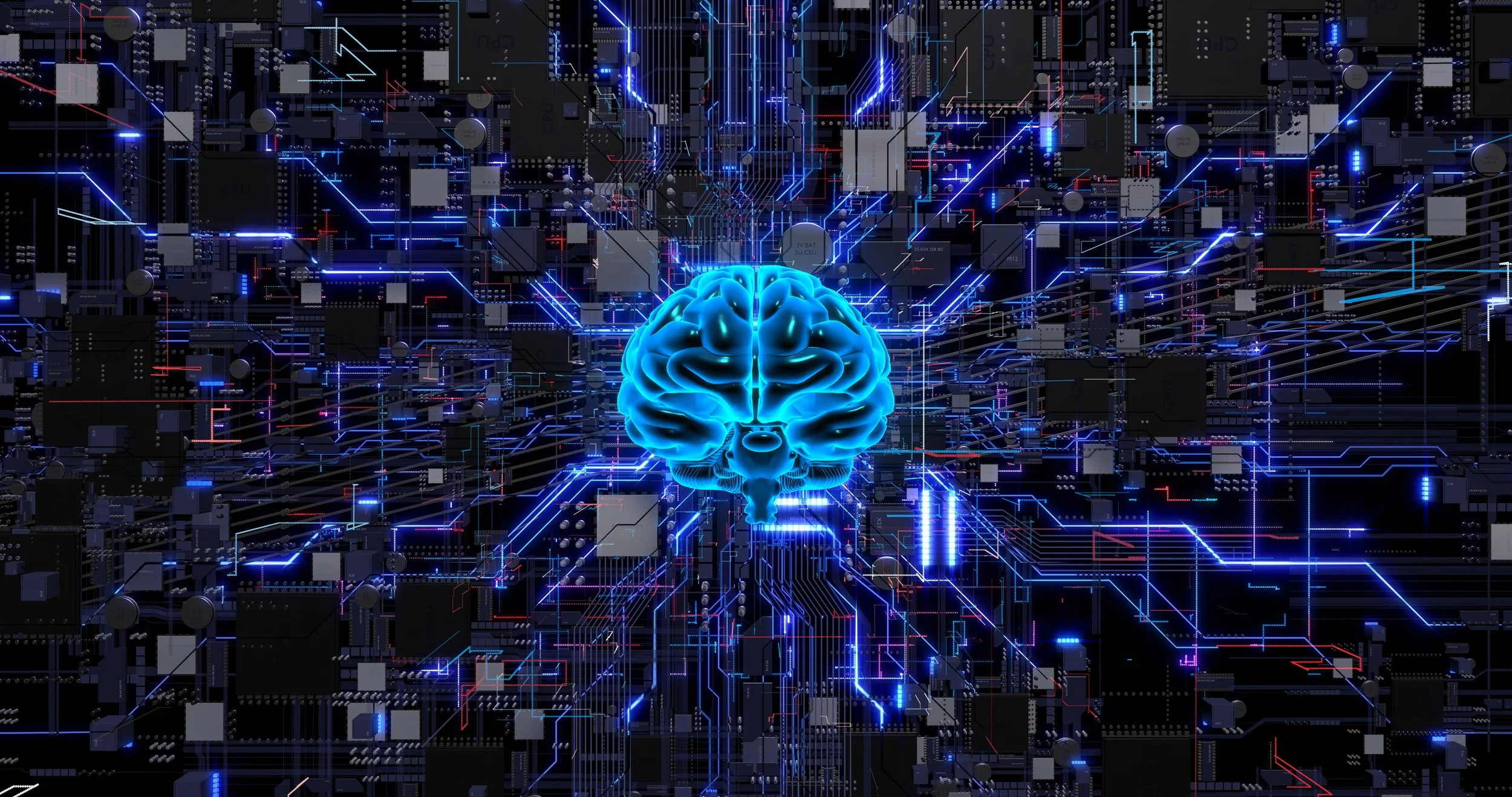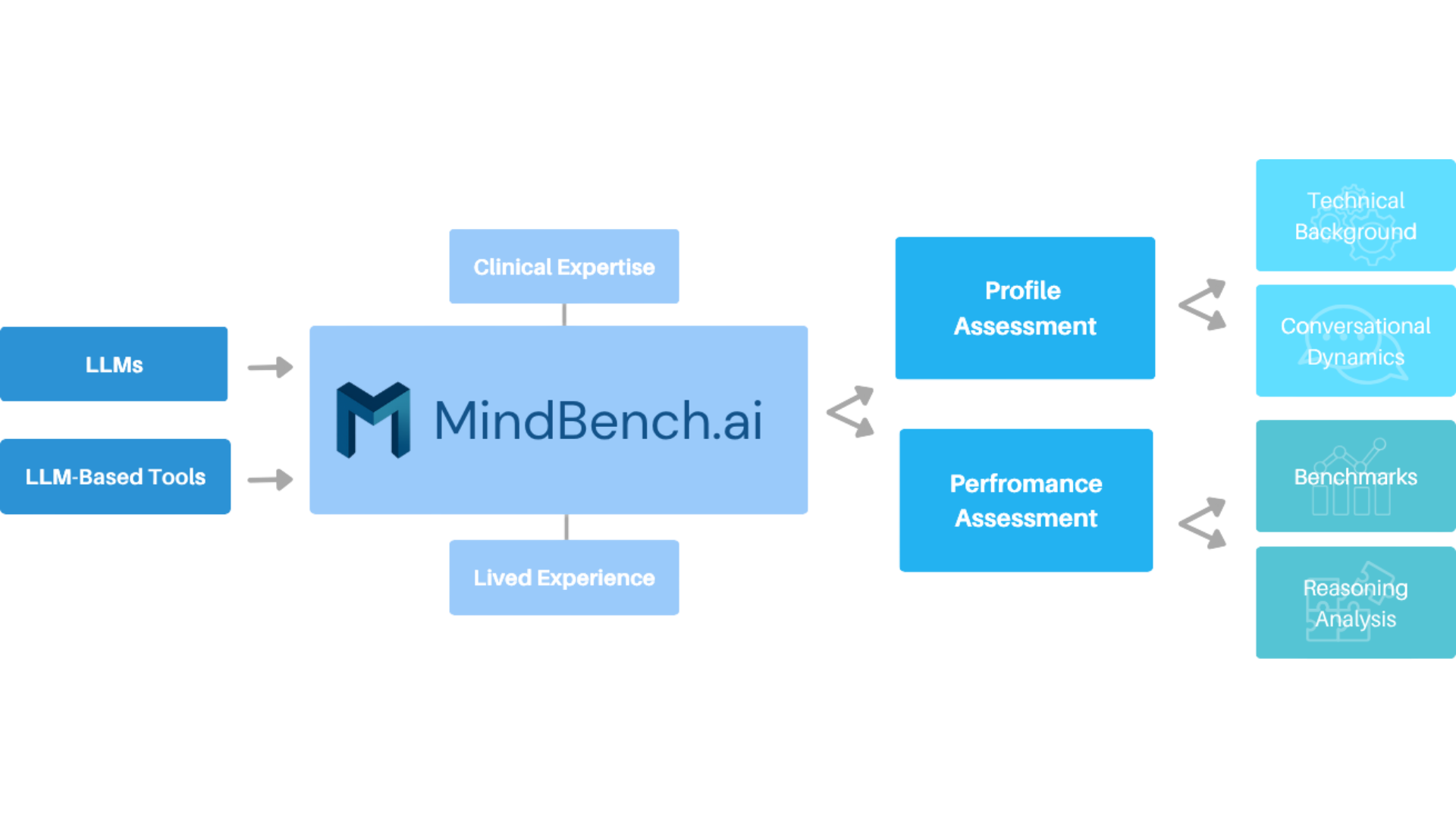
Artificial Intelligence Standards
Artificial Intelligence is ever-changing and evolving, so it is important to know the current standards and research around AI. Check out this page to learn more!
AI Research Interests/Projects: Division of Digital Psychiatry
Artificial Intelligence and mental health have been intertwined since the very first AI tools ever created. As such, the different domains of ongoing research in MH-AI are both widespread and varied. Our work focuses on a few main areas that we have identified as critical foundations to build out in an effort to facilitate future discoveries.
-
MindBench.ai is a comprehensive online platform designed as a partnership with the National Alliance on Mental Illness (NAMI) to provide assessment tools that systematically evaluate LLMs and LLM-based tools with objective and transparent criteria from a healthcare standpoint, assessing both profile and performance characteristics.
Learn more: https://doi.org/10.1038/s44277-025-00049-6
-
We have done a large amount of work completing thorough literature reviews and analyses across domains. These range from user-focused tools like chatbots to more historic and technical systems involving machine learning. We feel that much existing research has been siloed and advanced without appropriate pause to review the spread of what currently exists, and work hard to fill this ever widening gap.
-
We focus heavily on bias, stigma, and social impact through our research. Understanding the different preferences that artificially intelligent tools surface is a critical research area in AI alignment. Our work focuses on everything from simple output bias assessment all the way to more cutting edge interpretability research to ensure that we are learning about the biases that emerge at all levels of AI systems.
Relevant Publications
2025:
Dwyer, B., Flathers, M., Sano, A., Dempsey, A., Cipriani, A., Gazi, A. H., ... & Torous, J. (2025). Mindbench. ai: an actionable platform to evaluate the profile and performance of large language models in a mental healthcare context. NPP—Digital Psychiatry and Neuroscience, 3(1), 28 https://doi.org/10.1038/s44277-025-00049-6
Flathers, M., Dwyer, B., Rozenblit, E., & Torous, J. (2025). Contextualizing Clinical Benchmarks: A Tripartite Approach to Evaluating LLM-Based Tools in Mental Health Settings. Journal of Psychiatric Practice®, 31(6), 294-301. https://journals.lww.com/practicalpsychiatry/abstract/2025/11000/contextualizing_clinical_benchmarks__a_tripartite.2.aspx
Shumate, J. N., Rozenblit, E., Flathers, M., Larrauri, C. A., Hau, C., Xia, W., ... & Torous, J. (2025). Governing AI in mental health: 50-state legislative review. JMIR Mental Health, 12, e80739. https://doi.org/10.2196/80739
Flathers, M., Xia, W., Hau, C., Nelson, B. W., Cheong, J., Burns, J., & Torous, J. (2025). Interpreting psychiatric digital phenotyping data with large language models: a preliminary analysis. BMJ mental health, 28(1), e301817. https://doi.org/10.1136/bmjment-2025-301817
Torous, J., & Greenberg, W. (2025). Large Language Models and Artificial Intelligence in Psychiatry Medical Education: Augmenting But Not Replacing Best Practices. Academic psychiatry : the journal of the American Association of Directors of Psychiatric Residency Training and the Association for Academic Psychiatry, 49(1), 22–24. https://doi.org/10.1007/s40596-024-01996-6
2024:
Blease, C., Worthen, A., & Torous, J. (2024). Psychiatrists' experiences and opinions of generative artificial intelligence in mental healthcare: An online mixed methods survey. Psychiatry research, 333, 115724. https://doi.org/10.1016/j.psychres.2024.115724
Chen, K., Lane, E., Burns, J., Macrynikola, N., Chang, S., & Torous, J. (2024). The Digital Navigator: Standardizing Human Technology Support in App-Integrated Clinical Care. Telemedicine and E-Health, 30(7), e1963–e1970. https://doi.org/10.1089/tmj.2024.0023
Flathers, M., Smith, G., Wagner, E., Fisher, C. E., & Torous, J. (2024). AI depictions of psychiatric diagnoses: a preliminary study of generative image outputs in Midjourney V.6 and DALL-E 3. BMJ mental health, 27(1), e301298. https://doi.org/10.1136/bmjment-2024-301298
Lee, C., Mohebbi, M., O'Callaghan, E., & Winsberg, M. (2024). Large Language Models Versus Expert Clinicians in Crisis Prediction Among Telemental Health Patients: Comparative Study. JMIR mental health, 11, e58129. https://doi.org/10.2196/58129
Kim, J., Leonte, K.G., Chen, M.L. et al. (2024) Large language models outperform mental and medical health care professionals in identifying obsessive-compulsive disorder. npj Digit. Med. 7, 193. https://doi.org/10.1038/s41746-024-01181-x
Torous, J., & Blease, C. (2024). Generative artificial intelligence in mental health care: potential benefits and current challenges. World psychiatry : official journal of the World Psychiatric Association (WPA), 23(1), 1–2. https://doi.org/10.1002/wps.21148
2020:
Wisniewski, H., & Torous, J. (2020). Digital navigators to implement smartphone and digital tools in care. Acta psychiatrica Scandinavica, 141(4), 350–355. https://doi.org/10.1111/acps.13149
